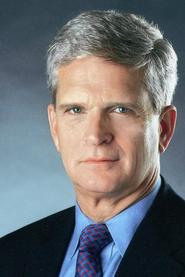
Edward Walker '62, Christian A. Johnson Distinguished Professor of Global Political Theory and former U.S. ambassador to the United Arab Emirates, Egypt and Israel, presented his views on current U.S. relations in the Middle East as a featured speaker during Reunion Weekend on Saturday, June 2.
Originally titled "The New Middle East: A Sad Day for America," Walker re-wrote his remarks after reading the morning's New York Times article titled "Rice Plays Down Hawkish Attitudes About Iran."
"I woke up this morning thinking I had a talk prepared for today. Then I read the Times," Walker began. "I read that the secretary of state was trying to respond to reports that there was a deep split in the administration and that the vice president, pressed by his staff, led by David Wurmser, was convinced that there was no answer to Iran other than a military answer."
Drawing comparisons between White House personnel and rhetoric leading up to Operation Iraqi Freedom in 2003 and current administration posturing regarding Iran, Walker noted that "Wurmser, currently the principal deputy assistant to Mr. Cheney for National Security Affairs, was previously a part of the Pentagon team who gave us Iraq."
With a series of rhetorical questions, Walker identified issues that both the administration and the American people must take into account when considering war with Iran.
Acknowledging that the situation is "daunting," Walker lamented the loss of American credibility on the world stage. Citing a regional poll conducted by the University of Maryland and GlobeScan in 2005, Walker noted broad-based displeasure with U.S. involvement and its actions in the Middle East and the "good will" we have lost in the region. While recognizing that U.S. "foreign policy is not a popularity contest," Walker cautioned that military intervention in Iran would have negative consequences and severely hinder our efforts to get things done regionally and globally.
Walker proposed that we shift our view of the Middle East. "So long as we see the U.S. as the principle target of the Islamists, we will miss the point. The real battle of the Middle East is the battle within the Middle East." He noted the regional clash in the Middle East is "between those in the region who seek to accommodate to the modern globalized world and those who seek to retain the purity of family values, tradition and strict religious constructionism."
Providing historical context, Walker reminded the audience of the "divide between the Shiite and Sunni branches of Islam." He also noted the competition between Egypt, Syria, Baghdad, Riyadh and Tehran for dominance in the region and the impact of those dynamics on any U.S. action.
Recalling accusations that his comments during a speech at his 40th reunion left the audience with more questions than answers, Walker offered the following suggestions for U.S. foreign policy in the region.
"First, for generations our foreign policy was seen as defensive, built around the defense of ourselves and others against communism. We did not claim exception from the constraints of international law and practice and, while we often acted unilaterally, we never made pre-emptive defense into a policy that applied for us and for no one else. In fact, we often opposed Israel's practice of pre-emption. It is time to return to a policy of defense – defense against terrorism.
"Second, we may be a superpower, but we do not have super powers. We cannot go it alone. And while we cannot let others dictate our policies, nor can we do without their support. And if we cannot get it, we had better question the legitimacy of our policy in the first place.
"Third, despite our close relationship with Israel, and to some extent because of it, we were seen as the key to a fair and balanced solution to the Palestinian problem. It is our close relationship with Israel that established our position as a valid mediator. To gain respect in the region we have to use that relationship actively to find a solution to the Palestinian problem.
"And fourth, we used to stand for something; freedom, democracy, human rights, and a standard of behavior toward our own people and others that many people in the region aspired to. We were a symbol of what could be, yet we did not try to impose our values and culture on others. We have to clean up our act and be true once more to our values and act as beacon for others rather than a dictator of culture and behavior."
Prior to fielding a number of questions from the audience, Walker closed with the suggestion for a fresh start, stating, "In sum, we do need a clean break, a break from the practices that diminish our stature and our ability to lead the world."
